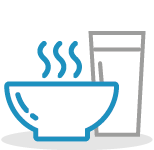Would you like help to support your staff with money wellbeing? Not sure how to help?
We know that money worries can affect everyone at some point in their live, such as ill health, family job loss, disability, caring responsibilities, relationship breakdown or bereavement.
You can do a great deal to help your team members by ensuring that they know where to turn if money becomes a problem. You don’t have to go in ‘too deep’ and fix problems for staff, but by helping them to find the right advice, you could help to reduce their stress and anxiety and possibly also prevent absenteeism and presenteeism.
Signs that staff may need support with money worries
Use the ‘All About Money’ page and guidance below to find out when staff may need support with their financial wellbeing, and the support available.
Attendance
Consider patterns of absence; absences at the end of the month or due to stress may be related to issues with money.
The Attendance Policy and Supporting Documents both offer advice on supportive management of absence
Performance
The stress of having money worries may affect the workplace performance of a staff member. All employees are required to perform the duties of their post to an acceptable standard.
The Capability Policy and Supporting Documents both provide a clear process to support and manage employees who are required to improve their knowledge, skills or ability to perform their role.
Long Term Health Conditions
A member of staff who has had a diagnosis of a long term health condition, for example cancer, may well be worrying about the financial impact of their diagnosis.
Support and Information Services
You can signpost or refer staff with a long term health condition to the Support and Information Services (SIS).They offer a wide range of support, and have links to community based advice organisations, including those for free, confidential, quality assured money advice and debt resolution. There is a Support and Information Service in the foyer at Stobhill ACH, New Victoria ACH, Glasgow Royal Infirmary and Queen Elizabeth University Hospital. However, enquiries can also be made over the phone or via email no matter what site the member of staff is based in.
Check the web page for locations, opening times and local phone number, or email: sis@ggc.scot.nhs.uk
Coping with a Health Problem: Help for Staff
You can also download a copy of Coping with a Health Problem: Help for Staff (pdf). It contains a wealth of information to support staff physical and mental health and can be used during supportive discussions with staff.
Staff who are off sick and going onto reduced pay
A member of staff who has been ill for some time and who has gone onto half pay or no pay will probably have significant concerns about money.
If you are keeping in touch with absent staff, it can help them to ensure that they maximise their income and claim any benefits to which they are entitled. The Support and Information Service will enable them to access this help through money advice services.
Lapses in Professional Registration
NHSGGC employs thousands of staff who are expected to maintain some form of registration with a professional body. The cost of this can amount to several hundred pounds per year. Where lapses in registration occur, consider that money worries may be part of the problem and be prepared to supportively manage and signpost to help.
The NHSGGC Policy on Employment of Statutory Registered Professionals details advice and responsibilities for managers.
You can also support staff by raising awareness of the tax relief that can be easily claimed on professional registration fees.
You could encourage staff to use the NHS Credit Union as a means to budget and save for their professional registration fees.
Family issues and caring responsibilities
Throughout the course of a working life, personal circumstances can change considerably, for example through ill health, family job loss, maternity, disability, caring responsibilities, relationship breakdown or bereavement. At times like these money can sometimes become a worry and staff may need support. A referral to the Support and Information Service will enable staff to access the help they need for many of these issues including access to carer’s support and money advice.
Further information
Bereavement
For bereavement, a wide range of resources are available to support staff to cope with bereavement, whether personal or professional.
Caring responsibilities
If staff are responsible for caring for a family member, dependent or close friend there is help and support available for them and the person they look after. Visit the carer’s support web pages:
Breathing Space
Breathing Space provides a free confidential phone line that staff can call if they’re feeling down or anxious about anything.
Call 0800 83 85 87, Monday to Thursday, 6.00pm – 2.00am. Friday to Monday, 6.00pm – 6.00am
Flexible working policy
Universal Credit
Universal Credit has recently been introduced across Greater Glasgow and will replace a number of existing benefits including Housing Benefit and Working and Child Tax Credits. This financial support is available for people on a low income or out of work. It’s a monthly payment to help with living costs, and the amount depends on how much is earned in a month. Staff do not need to do anything about moving over to Universal Credit until they hear from the Department of Work & Pensions, unless their circumstances change.
Why it’s important to challenge poverty stigma [online learning]
Public Health Scotland’s Virtual Learning Environment [VLE] has developed 6 modules aimed at those working in front line public services, with some sections dedicated to those in a management role. Please see list below
· Understanding Poverty
· Understanding Poverty, Stigma and Discrimination
· Poverty Sensitive Practice
· My Role in Service Planning and Design
· My Role in Organisational Policy
· My Role as a Line Manager
The module objectives are;
- Provide an overview of poverty in Scotland
- Raise awareness of stigma and discrimination associated with poverty
- Raise awareness of the impact of poverty stigma and discrimination on individuals and their health and wellbeing
- Introduce sensitive approaches to reduce poverty stigma discrimination
To access these modules please visit the VLE using this link Course: Challenging poverty stigma and discrimination (publichealthscotland.scot)
You will be required to enrol to access these modules
Please familiarise yourself with the Challenging Poverty Stigma Hub by watching this short VT. To access click on the link below








